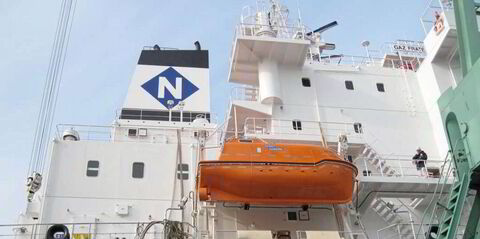A ban on foreign security escorts on cargoships in the Gulf of Guinea off Nigeria is coming under increased criticism after a spate of pirate attacks in the region this month that left one officer dead and three crew members abducted.
Despite the obvious deterioration of the security situation, local governments continue imposing their own security arrangements on ships plying their territorial waters. Nigerian authorities arrested two foreign guards operating in its waters this week.
Three ships were recently detained because they sailed into Nigerian waters with people on board linked to private military and security companies (PMSCs), shipping body Bimco reported in a Gulf of Guinea security advisory issued on 4 February.
The Nigerian government will not hesitate to detain any ship entering the country’s territorial and coastal areas with unlicensed security escorts on board, according to the report.
“The Nigerians are pushing in a direction that’s not necessarily the one in which charterers and owners would have normally dealt with the situation,” a market source said on condition of anonymity.
Unlike countries around the Indian Ocean, another piracy hotspot, authorities in the Gulf of Guinea effectively ban foreign, armed PMSCs from operating in their waters.
Local authorities are known to offer licences to select companies employing local guards.
Alternatively, they are backing domestic operators with ties to local security forces that are trying to set up safe, patrolled anchorage areas.
“Charterers are trying to impose on owners to rely just on this type of security company because they [the companies] are playing the game of local authorities,” the source said.
TradeWinds understands that talks between some charterers and owners to address the situation had been ongoing on 3 February, when the Greek-owned, 281,000-dwt tanker Kalamos (built 2000) was attacked when awaiting loading off Bonny with 23 crew on board.
The ship’s Greek first officer was killed in the raid and a further two officers and one able seaman from Greece and Pakistan were abducted.
Two days earlier, a high-speed boat approached the Nigerian-flagged, 40,900-dwt products tanker Remi (built 1990) while it was anchored about 10 nautical miles (18.5 kilometres) off Escravos, Nigeria.
In a separate attack the week before that, armed pirates boarded and hijacked a fishing vessel off Togo, with information surfacing that they were planning to use it as a pirate mother ship.
“The region has become extremely dangerous. Products tankers and kidnapping of Caucasian crews seem to be the primary objective of the pirates,” Bimco said.
They added: “Attacks [are] becoming more widespread and violent… no [ship] type is entirely safe”.
According to the advisory, pirates in the Gulf of Guinea are more violent than in Somalia.
Another key difference to the kind of attack launched in the Indian Ocean is that Nigerian pirates usually approach their victims with high-powered speedboats, sometimes launched from unidentified motherships.
Unlike the Indian Ocean, the Gulf of Guinea is not an internationally designated high-risk area and is not policed by international navies.
Owners are increasingly worried about their situation but their desire for work seems to be outweighing any fears. “Given the current market for MR [medium-range], LR1 [long-range-one] and LR2 ships, they really cannot afford not to go there”, the market source said.


